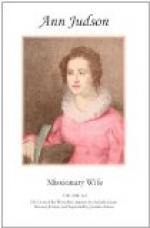From what we can learn, we infer that the prominent traits in her character were strong affections, energy, and disinterestedness. Of a slight and delicate frame and constitution, and a sensibility almost amounting to sensitiveness, she at an early age engaged in duties and made sacrifices scarcely expected from the robust and vigorous. And her exertions had for their end mainly to benefit those she loved. Whether she taught in the district school, or in the higher seminary, or wrote Sunday-school books, or contributed to literary periodicals, her affection for her mother, and desire to lighten her burdens, seem to have stimulated her exertions and called forth her powers. In her early religious experience, the same disinterestedness manifested itself; for no sooner did she feel the renewing power of faith in her own heart, than she longed to impart even to the distant heathen the same precious blessing.[14] Unselfish affection is also, we think, a strongly marked trait in her married life. Not long after their arrival in Burmah, Mr. Judson writes: “Emily loves the children as if they were her own.” And again, nearly two years later: “We are a deliciously happy family;” and again, “Emily has taken to my two boys as if they were her own; so that we are a very happy family; not a happier, I am sure, on the broad earth.”
Another proof of the same trait, was her loving and sympathetic appreciation of a peculiar trait in her husband, which, had her disposition been less noble, might have caused her some annoyance. Of this trait Dr. Wayland thus speaks: “There was a feature in Dr. Judson’s affection as a husband, which was, I think, peculiar. He was, as it is well known, married three times, and no man was ever more tenderly attached to each of his wives. The present affection, however, seemed in no respect to lessen his affection for those for whom he mourned. He ever spoke of those who had gone before, with undiminished interest. In one of his letters to his daughter, after saying he did not believe there existed on earth so happy a family as his, he soon after adds: ’My tears fall frequently for her who lies in her lone bed at St. Helena.’ It was at his suggestion that Mrs. Emily Judson wrote the life of her predecessor. He frequently refers with delight to the time when he, and all those whom he so much loved, shall meet in Paradise, no more to part, but to spend an eternity together in the presence of Christ. Those that were once loved were loved to the end; but this did not prevent the bestowment of an equal amount of affection on a successor.” To quote the words of another, speaking of Mrs. Mary Ware, who, placed in similar circumstances to Mrs. Judson, showed the same noble superiority to a common weakness of her sex: “She had no sympathy and little respect for that narrow view which insists that the departed and the living cannot share the same pure love of the same true heart. With regard to a former wife—’she was the nearest and dearest to him’—she would say, ’how then can I do otherwise than love and cherish her memory?’ And her children she received as a precious legacy; they were to her from the first moment like her own; neither she nor they knew any distinction.”




